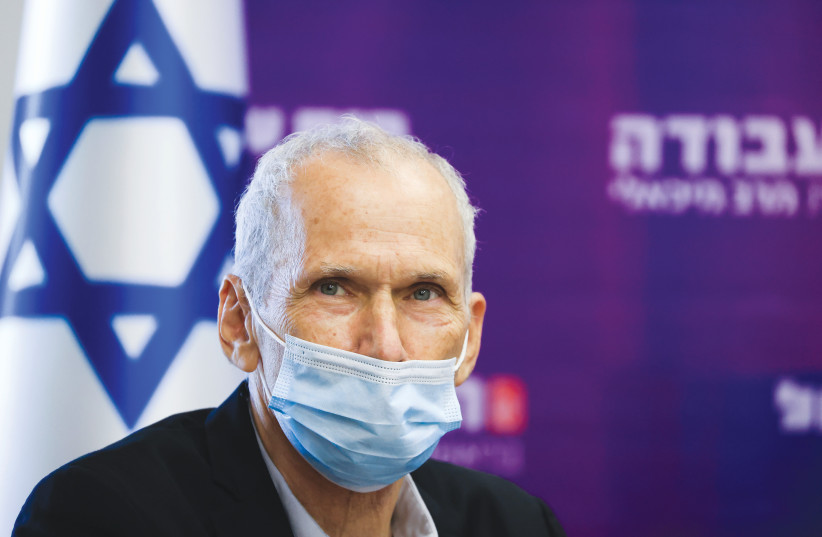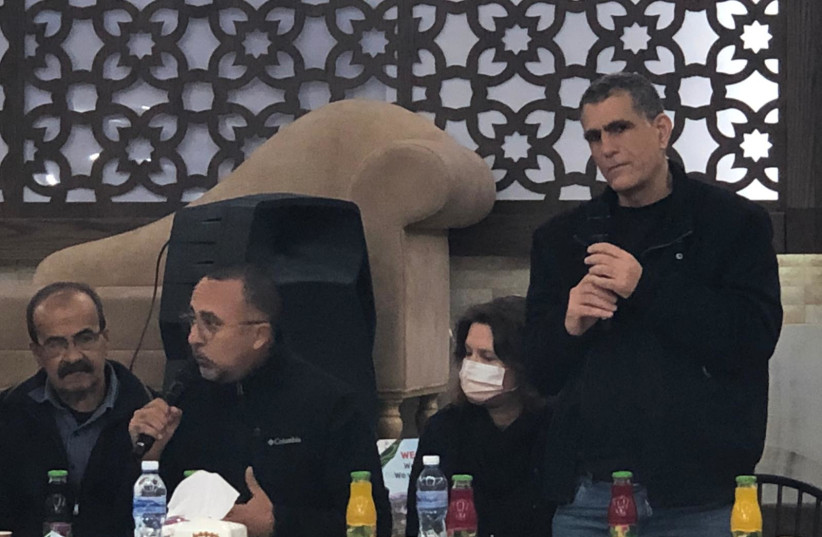The Jewish extremists who executed the Burin attack should be considered an “organized terror group,” Public Security Minister Omer Bar Lev (Labor) told KAN Radio on Sunday.
He spoke two days after settlers beat left-wing activists and Palestinians with clubs and shovels as they planted saplings near the village of Burin in the Samaria Region, not far from Nablus.
They torched one of the Israeli vehicles in broad daylight, pouring gasoline on the car and setting it ablaze, as the activists stood nearby fearful for their lives.
“This is the activity of a terror organization,” Bar Lev said.
During the interview, Bar Lev was careful not to name the group of attackers, either as Jewish extremists or settlers, but rather referenced them in a general way.

Bar Lev said he didn’t want to appear dismissive about vandalism against Palestinian property by the “hilltop youth,” a term used to reference Jewish extremists living in encampments on West Bank hilltops.
This incident was more severe, he said.
“It appears, the way I see it, that we are talking about an organized activity by a terror group that acted together to come and harm primarily Israeli citizens who had come to protest at the site. They harmed them and torched their car,” he said.
Activists and Palestinians were able to document the incident with photographs and videos, which were distributed to the media.
There is now a coordinated investigation into the incident by the Shin Bet (Israel Security Agency) and the police, Bar Lev said.
No arrests have been made yet, he said, because it is very difficult to collect evidence in cases like this, even if someone has recognized any of the individuals involved.
The attack occurred in Area B, he said, referencing an area of the West Bank that is under the auspices of the Palestinian Authority.
It took time until the police and army arrived at the site of the attack and by the time they had done so, those involved had already dispersed, he said.
Bar Lev has been harshly criticized in the past for his comments against settler violence and Jewish extremists, referring last month to such attackers as “sub-human.”
Israeli politicians are often loathe to condemn Jewish violence against Palestinians, speaking up more readily when security forces or Jewish civilians are harmed.
MK Michal Waldinger (Religious Zionist Party) tweeted that she felt that the media focused more on settler violence than on Palestinian violence against Israelis. Waldinger said she condemned the Burin attack, but wanted to underscore that over the weekend there were 18 Palestinian stoning attacks against Israelis in the West Bank, eight incidents in which Molotov cocktails were thrown and seven incidents of burning tires.
Politicians from the Right and the Left have condemned the Burin attack, including the Yesha Council, which is the political arm of the settler movement.
The highest-ranking official to speak out on the latest incident was Foreign Minister Yair Lapid (Yesh Atid), while both Defense Minister Benny Gantz (Blue and White) and Prime Minister Naftali Bennett (Yamina) have yet to speak out on the matter.
The police reported on Sunday morning that a number of Palestinian vehicles had been vandalized in the village of Keda in the Samaria region.
Vandals presumed to be Jewish extremists and or settlers had spray-painted large Jewish stars on several vehicles. They also wrote out in Hebrew “enough with administrative detentions,” referencing their protest of a policy that allows Israeli police to hold Jewish suspects without charges.
Burin has been the site of a number of violent incidents caught on video, including shots of settlers and Jewish extremists throwing stones at homes on the edge of the village.
But the village is just one of a number of flashpoints in the Samaria region. The areas around the former Evyatar outpost and the former Homesh settlement have also been violent flashpoints between Israeli and Palestinian civilians, as well as between the IDF and Palestinians.
Last month a Palestinian terrorist killed an Israeli civilian, Yehuda Dimentman, 25, as he left the Homesh hilltop. Dimentman had been a student at the illegal yeshiva. It has existed there for over 15 years, as part of an activist drive to encourage the reconstruction of the Homesh settlement which the government under then prime minister Ariel Sharon destroyed in 2005.
Much of the land on the hilltop belongs to the nearby Palestinian village of Burka. The High Court of Justice has upheld the rights of the Palestinians from Burka to farm their land.

On Sunday, two Meretz parliamentarians Michal Rozen and Mossi Raz traveled to Burka, to hold a meeting with residents so they could hear first hand of the attacks they have endured.
The village is located just below the Homesh hilltop and Palestinians charged that settlers come down with the intent to vandalize property or attack village residents.
Violence has also broken out between Palestinian farmers and settlers on the Homesh hilltop itself.
Rozin called on the IDF and police to “stop extremist settler violence” and to evacuate the Homesh yeshiva.
Raz said that current reality in which settlers can access Homesh but the Palestinians from Burka lack easy access to the hilltop must be changed.
Raz said that in Burka he found people who wanted peace and freedom. “We also want peace and freedom,” he said.
He also told those assembled in the large hall, that he supported the creation of a Palestinian state in the West Bank and he hoped that when he returned to Burka it would be to see it as part of a Palestinian state .
“Together we will win out over the settlers and the occupation,” he said.
